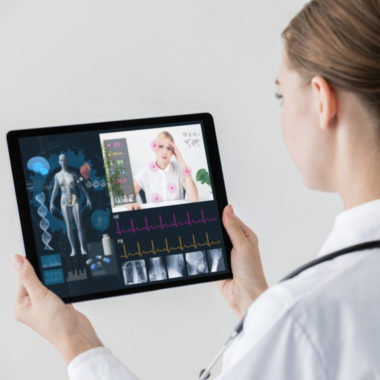It is no secret that healthcare systems around the globe are facing unprecedented challenges. Beyond the obvious spectre of the pandemic, health services need to provide a growing, increasingly elderly, population, with quality healthcare despite rising costs. One way to ease pressure on these overburdened systems has been to look towards telehealth, a broader term used to define all medical services and health education that are delivered digitally and remotely to patients.
These digital health technologies can improve access to health services, reduce costs, improve quality of care and enhance the efficiency of health systems.
How healthcare has transformed during the pandemic
While the concept of telemedicine isn’t exactly new per se, the COVID-19 pandemic has really put the technology front and centre. With many state and local governments issuing stay-at-home orders to help prevent the spread of the virus, patients were physically unable to attend certain clinics, especially given that healthcare centres were more likely to be prioritising patients with the coronavirus.
But telemedicine isn’t the only area of healthcare that’s become contact free since the beginning of the pandemic. We’ve also seen, for example, the way we receive our prescriptions and medical results change, now often coming in the form of a text or an email from your healthcare provider. These changes are likely to remain in place after the pandemic, as they offer patients and doctors a quicker, more convenient way to distribute important information, without the need for a time-consuming appointment.
Lastly, while this drive towards the digital has long been a trend for medical devices, it has accelerated in the last year. With patients (particularly those with long term illnesses) unable to have their vitals checked in person, the number of connected medical devices that transmit data from one remote location to another has soared. Now, using connected devices with IoT sensors, a continuous stream of health data such as heart rate, blood pressure, and glucose monitoring can be sent in real-time to your doctor who can receive an alert if the readings look anomalous.
The challenges faced by connected healthcare systems
As with any new technologies, especially those that are rolled out quickly or in challenging circumstances, there are always bad actors looking to exploit any vulnerabilities they can find. This has been particularly prevalent during the pandemic with the number of cyberattacks on healthcare rising significantly.
The threat is multifaceted due to the large number of digital attack points. Telemedicine, for instance, has generated a larger pool for potential phishing scams, as patients often need to click on a link in an email to access the service. Such techniques can also be problematic for healthcare providers, as hackers try these methods with the aim of gaining entry to an unsecured network. We’ve written about this phenomenon in the past here.
On the connected medical devices side, the personal data these devices hold is a valuable target to malicious actors. Indeed, this is highlighted by a recent study which found 82% of organisations that have deployed medical devices with Internet of Things (IoT) capabilities have experienced a cyberattack.
Statistics like these are important to be aware of in order to understand the extent of the challenge healthcare providers are facing when it comes to cybersecurity. Nonetheless, it also underlines why it’s so important to put security measures in place – as without these, doctors and patients will simply not feel confident using these new innovative solutions in healthcare.
The protective measures that can be put in place
Companies that can provide safe, secure and reliable telehealth to their patients will reap the rewards. There are a variety of security mechanisms that can be put in place to protect telehealth services, depending on a provider’s objectives.
For IoT connected medical devices, for example, it is essential that healthcare providers ensure the manufacturer they choose has designed digital security into the device from the ground up and at all points in the ecosystem to prevent vulnerabilities at the weakest point jeopardising the security of the whole device.
With any service that collects patient data, it is important that such personal data is protected at every possible point in the network. For this reason, healthcare providers should prioritise encrypting data across devices, processes, and platforms on premises and in the cloud. This ensures that even if an attacker manages to access an unsecured device, the files it contains are rendered useless.
Finally, for those working within a healthcare organisation, a zero trust model should be adopted to minimise vulnerabilities throughout a corporate network. In practice, this works by using multi-factor authentication for any login attempts, as well as limiting the user’s access to only the segments approved for the user – not the whole network – so in the worst-case scenario, a hacker could only access a very small portion of the healthcare records not everything stored on the server.
With these security measures in place, patients and doctors can rest assured that any data collected with their healthcare organisation is secured by the best possible protective measures. This will raise confidence in the effectiveness of telehealth as a viable alternative for the way we continue to receive healthcare, even after the pandemic.
Interested and want to learn more? Leave a comment below or tweet us @ThalesDigiSec if you have any questions.



